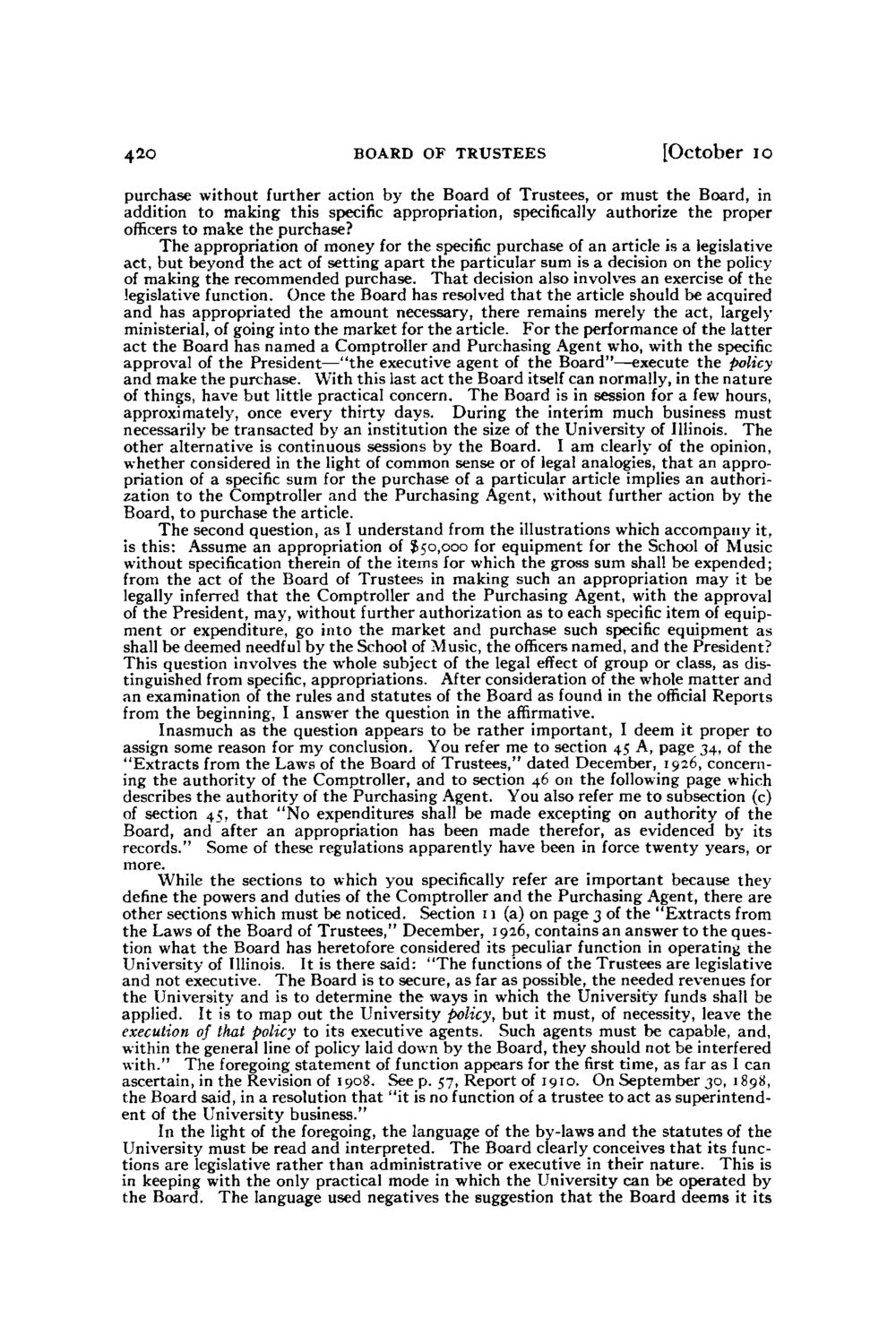| |
| |
Caption: Board of Trustees Minutes - 1930
This is a reduced-resolution page image for fast online browsing.

EXTRACTED TEXT FROM PAGE:
420 b o a r d of trustees [October 10 purchase without further action by the Board of Trustees, or must the Board, in addition to making this specific appropriation, specifically authorize the proper officers to make the purchase? The appropriation of money for the specific purchase of an article is a legislative act, but beyond the act of setting apart the particular sum is a decision on the policy of making the recommended purchase. That decision also involves an exercise of the legislative function. Once the Board has resolved that the article should be acquired and has appropriated the amount necessary, there remains merely the act, largely ministerial, of going into the market for the article. For the performance of the latter act the Board has named a Comptroller and Purchasing Agent who, with the specific approval of the President—"the executive agent of the Board"—execute the policy and make the purchase. With this last act the Board itself can normally, in the nature of things, have but little practical concern. T h e Board is in session for a few hours, approximately, once every thirty days. During the interim much business must necessarily be transacted by an institution the size of the University of Illinois. T h e other alternative is continuous sessions by the Board. I a m clearly of the opinion, whether considered in the light of c o m m o n sense or of legal analogies, that an appropriation of a specific s u m for the purchase of a particular article implies an authorization to the Comptroller and the Purchasing Agent, without further action by the Board, to purchase the article. T h e second question, as I understand from the illustrations which accompany it, is this: Assume an appropriation of $50,000 for equipment for the School of Music without specification therein of the items for which the gross sum shall be expended; from the act of the Board of Trustees in making such an appropriation m a y it be legally inferred that the Comptroller and the Purchasing Agent, with the approval of the President, may, without further authorization as to each specific item of equipment or expenditure, go into the market and purchase such specific equipment as shall be deemed needful by the School of Music, the officers named, and the President? This question involves the whole subject of the legal effect of group or class, as distinguished from specific, appropriations. After consideration of the whole matter and an examination of the rules and statutes of the Board as found in the official Reports from the beginning, I answer the question in the affirmative. Inasmuch as the question appears to be rather important, I deem it proper to assign some reason for m y conclusion. Y o u refer m e to section 45 A, page 34, of the "Extracts from the Laws of the Board of Trustees," dated December, 1926, concerning the authority of the Comptroller, and to section 46 on the following page which describes the authority of the Purchasing Agent. Y o u also refer m e to subsection (c) of section 45, that " N o expenditures shall be m a d e excepting on authority of the Board, and after an appropriation has been made therefor, as evidenced by its records." S o m e of these regulations apparently have been in force twenty years, or more. While the sections to which you specifically refer are important because they define the powers and duties of the Comptroller and the Purchasing Agent, there are other sections which must be noticed. Section 11 (a) on page 3 of the "Extracts from the Laws of the Board of Trustees," December, 1926, contains an answer to the question what the Board has heretofore considered its peculiar function in operating the University of Illinois. It is there said: "The functions of the Trustees are legislative and not executive. T h e Board is to secure, as far as possible, the needed revenues for the University and is to determine the ways in which the University funds shall be applied. It is to m a p out the University policy, but it must, of necessity, leave the execution of that policy to its executive agents. Such agents must be capable, and, within the general line of policy laid down by the Board, they should not be interfered with." The foregoing statement of function appears for thefirsttime, as far as I can ascertain, in the Revision of 1908. See p. 57, Report of 1910. O n September 30, 1898, the Board said, in a resolution that "it is no function of a trustee to act as superintendentkeeping University business."negatives the suggestion thatconceivesstatutes of the in ofare with the read and interpreted.inThe Board clearlyin their be operated by tionsInthelegislativethe foregoing, the language of the by-laws andcan nature. its functhe Board. light be only practical mode University must of rather used administrative or executive the Board deems it its the The language than which University the that This is
| |